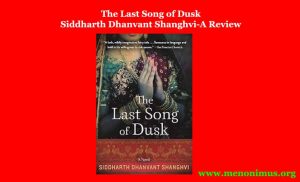The Last Song of Dusk | Siddharth Dhanvant Shanghvi | A Review
The Last Song of Dusk Siddharth Dhanvant Shanghvi A Review
The Last Song of Dusk by Siddharth Dhanvant Shanghvi-A Review
“The Last Song of Dusk” by Siddharth Dhanvant Shanghvi is a mesmerizing work of fiction that weaves a rich tapestry of emotions, relationships, and cultural nuances. Published in 2004, this debut novel showcases the author’s exceptional ability to blend poetic prose with intricate storytelling, resulting in a haunting and unforgettable reading experience.
Plot and Setting:
Set in 1920s India, the novel introduces us to Anuradha Gandharva, a young woman who marries a man she barely knows. As the story unfolds, we are introduced to a cast of complex characters, each struggling with their own desires, secrets, and wounds. The narrative primarily takes place in the grand mansion of Jarmuli, which is beautifully depicted and serves as a microcosm of the world outside. The setting, both physical and emotional, adds depth and atmosphere to the story, making it an integral part of the narrative.
Characters:
Shanghvi’s characters are remarkably well-crafted, each possessing a distinct voice and a hidden layer of complexity. Anuradha, the protagonist, embodies a blend of vulnerability and strength, her journey from innocence to maturity forming the emotional core of the novel. The supporting characters, such as the enigmatic Vardhmaan, the eccentric Nandini, and the misunderstood Brijmohan, contribute to the richness of the narrative. Shanghvi explores their relationships, vulnerabilities, and motivations with a delicate hand, enabling readers to connect deeply with their struggles and triumphs.
Themes:
At its heart, “The Last Song of Dusk” is a novel about love, loss, and the passage of time. Shanghvi delves into themes of fate, destiny, and the transient nature of existence. The book also explores the interplay of tradition and modernity, as India undergoes significant social changes during the 1920s. The characters’ struggles with societal expectations and personal desires mirror the larger cultural shifts happening around them.
Prose and Style:
Shanghvi’s writing style is evocative and lyrical, often bordering on poetic. His descriptions are vivid, invoking all the senses and painting a vivid picture of the world he creates. This style not only enhances the reader’s immersion in the story but also reflects the characters’ emotions and the ethereal nature of their experiences. The novel’s prose is filled with poignant metaphors and symbolic imagery, creating a sense of enchantment that lingers even after the book is closed.
Narrative Structure:
The novel is structured in a non-linear fashion, moving seamlessly between past and present, with flashbacks and shifting perspectives. This structure might require readers to pay close attention to the timeline, but it adds depth to the characters and allows for the gradual revelation of their histories and motivations.
Emotional Impact:
One of the novel’s greatest strengths is its ability to evoke a wide range of emotions. From love and longing to pain and joy, readers are taken on an emotional rollercoaster as they become invested in the lives of the characters. Shanghvi masterfully captures the complexities of human emotions, making the reader’s connection to the characters and their stories profound and lasting.
Conclusion:
“The Last Song of Dusk” by Siddharth Dhanvant Shanghvi is a lyrical and profound exploration of love, loss, and the intricate web of human emotions. Through its beautifully crafted characters, evocative prose, and rich thematic exploration, the novel invites readers to contemplate the fragile nature of existence and the enduring power of human connections. This debut work cements Shanghvi’s place as a promising literary voice and leaves an indelible mark on the reader’s heart and mind. 0 0 0.
The Last Song of Dusk Siddharth Dhanvant Shanghvi A Review
Read More: Tips for Writing Essay
N. B. The article ‘The Last Song of Dusk Siddharth Dhanvant Shanghvi A Review’ originally belongs to the book ‘The Reviews of Epic Literature Around the World Vol-I‘ by Menonim Menonimus. The Mahabharata A Modern Rendering Ramesh Menon A Review.
Related Search:
- Epic in Literature
- The Sanskrit Epic
- The Illiad
- Beowulf











